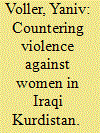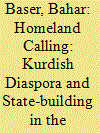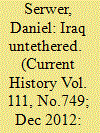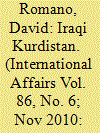|
|
|
Sort Order |
|
|
|
Items / Page
|
|
|
|
|
|
|
| Srl | Item |
| 1 |
ID:
179797


|
|
|
|
|
| Summary/Abstract |
The Kurdish armed forces and security forces, known as the Peshmerga and Asayish, respectively, have both been intensively politicized by the Kurdistan Democratic Party and the Patriotic Union of Kurdistan from their foundation to the present. The Kurdistan Regional Government (KRG) has already experienced serious systematic crises caused by weak democratic institutions, poor governance, and a dysfunctional party system. The failure to build cohesive armed forces in the Kurdistan Region of Iraq exacerbates these issues because it politicizes basic internal and external security. This article, based on interviews with the Kurdish authorities, discusses the ramifications of the KRG’s politicized forces on the democratic process, civil-military relations, the defence readiness of the Kurdish armed forces, societal instability, and judicial power. This research argues that Kurdish politicized forces severely affect the democratic process in the Kurdistan Region, create problems for civil-military relations, undermine defence readiness, cause instability, and also have a considerable, negative impact on judicial power.
|
|
|
|
|
|
|
|
|
|
|
|
|
|
|
|
| 2 |
ID:
131565


|
|
|
|
|
| Publication |
2014.
|
| Summary/Abstract |
The struggle against gender-based violence in the Iraqi Kurdistan Region has witnessed some significant achievements since the late 1990s. A subject long excluded from public discourse in the region, it has now moved increasingly into the mainstream, compelling the Kurdistan Regional Government (KRG) to take legal and practical measures against such practices as honor killings, female genital mutilation, and domestic violence. This article traces the sources of these shifts in the KRG's stance, looking especially at the role of transnational women's rights networks in the region. It highlights these networks' successful strategy of binding their cause to the KRG's endeavor to legitimize and consolidate its contested sovereignty over the Kurdistan Region. In doing so, the paper addresses an underexplored subject in the literature on women's rights campaigns in the Kurdistan Region and contributes to the study of transnational advocacy as a source of normative change.
|
|
|
|
|
|
|
|
|
|
|
|
|
|
|
|
| 3 |
ID:
129077


|
|
|
| 4 |
ID:
159236


|
|
|
|
|
| Summary/Abstract |
The Kurdistan Region of Iraq (KRI) has regional autonomy within Iraq and it has been undergoing institution- and state-building for the last decade. The Kurdish diaspora has played a major role in this process by providing vital assistance to reconstruction and development efforts. This article examines the interactions between the Kurdistan Regional Government (KRG) and its diaspora by focusing on the diaspora engagement initiatives formulated by the KRG. The arguments are based on extensive fieldwork (2012–2016) that the author conducted in the KRI and Europe, including interviews with diaspora members, returnees and policy-makers.
|
|
|
|
|
|
|
|
|
|
|
|
|
|
|
|
| 5 |
ID:
118263


|
|
|
|
|
| Publication |
2012.
|
| Summary/Abstract |
Iraq is still in search of internal equilibrium and its proper international role after the trauma of more than thirty years of Saddam Hussein's dictatorship and eight years of American military occupation…
|
|
|
|
|
|
|
|
|
|
|
|
|
|
|
|
| 6 |
ID:
099903


|
|
|
|
|
| Publication |
2010.
|
| Summary/Abstract |
In August 2010, the United States officially ended the combat mission of its military forces in Iraq and withdrew all but 50,000 of its troops from the country. Iraqi Kurds now contemplate the implications of the looming withdrawal of the remaining 50,000, scheduled for the end of 2011. While Arab-Kurdish relations in Iraq face the risk of serious deterioration, the US military withdrawal will probably not greatly affect the internal politics of Kurdistan. Given the de facto autonomy the region has enjoyed since 1991 and the Kurds' resulting experience with self-rule, Iraqi Kurdistan never suffered from the post-2003 security and political vacuums plaguing the rest of the country. As a result, no more than a few hundred coalition troops were stationed in Iraqi Kurdistan (and no coalition casualties have occurred there since 2003), with governance and security remaining completely in the hands of the Kurdish authorities.
While important centrifugal tendencies do exist in Iraqi Kurdistan and are discussed here, the region will most likely continue to deal with Baghdad and the rest of the outside world with the united voice it cultivated after 2003. US civilian personnel and advisers will also remain in Iraq after the military withdraws, which offers the possibility of assisting Iraqi Kurdistan to overcome obstacles in order to achieve better, more transparent governance. A continuing American diplomatic engagement in Iraq also offers the possibility of helping Kurdistan further institutionalize its autonomy vis-à-vis Baghdad and neighbouring states.
|
|
|
|
|
|
|
|
|
|
|
|
|
|
|
|
| 7 |
ID:
142156


|
|
|
|
|
| Summary/Abstract |
In Turkish political circles, there is a popular quip: “The United States wanted Turkey and Iraq's Kurds to become friends, not get married.”1 As their cooperation deepens, especially in hydrocarbons, observers increasingly question whether the relationship will endure. A solid strategic relationship is born of shared national interests, mutual respect and real interdependence. Fleeting cooperation, in contrast, stems from a temporary confluence of political interests, typically dependent on the personalities and preferences of leaders who may fall from power in the foreseeable future. Such cooperation can fulfill pressing needs, but both parties know the arrangement will be discarded in short order.
|
|
|
|
|
|
|
|
|
|
|
|
|
|
|
|
| 8 |
ID:
157017


|
|
|
|
|
| Publication |
New Delhi, KW Publishers Pvt Ltd, 2018.
|
| Description |
xvi, 298p.hbk
|
| Standard Number |
9789386288868
|
|
|
|
|
|
|
|
|
|
|
|
Copies: C:1/I:0,R:0,Q:0
Circulation
| Accession# | Call# | Current Location | Status | Policy | Location |
| 059266 | 956.6/RIA 059266 | Main | On Shelf | General | |
|
|
|
|
| 9 |
ID:
062769


|
|
|
|
|
| Publication |
Berlin, Westview Press, 2005.
|
| Description |
ix, 292p.hbk
|
| Standard Number |
0813343046
|
|
|
|
|
|
|
|
|
|
|
|
Copies: C:1/I:0,R:0,Q:0
Circulation
| Accession# | Call# | Current Location | Status | Policy | Location |
| 049769 | 956.704431/PHI 049769 | Main | On Shelf | General | |
|
|
|
|
| 10 |
ID:
158172


|
|
|
|
|
| Summary/Abstract |
Armen Oganesyan, Editor-in-Chief of International Affairs: Vitaly Vyacheslavovich, I get the impression that the correlation of forces in the Middle East is changing. For example, the American business news agency Bloomberg says: "If until recently the leaders of the Middle Eastern nations came only to Washington to solve their problems, America's influence in the Middle East is now noticeably weaker." How can this be, and why?
|
|
|
|
|
|
|
|
|
|
|
|
|
|
|
|
| 11 |
ID:
175135


|
|
|
|
|
| Summary/Abstract |
Ethnic and religious minorities have played a significant role in the long history of Kurdistan. At an official level, their political position was significantly strengthened with the advent of autonomy for the Kurdistan Region in northern Iraq in 1992. Most importantly, a quota system was established that reserved seats for several minority groups in the Kurdistan Parliament, often cited as an example of tolerance for diversity and respect for minority rights. Nevertheless, there is a lack of empirical research examining how ethnic and religious quotas affect democratic stability, quality of representation, and opportunities to represent authentic interests within the Kurdistan Regional Government (KRG). The politicians who occupy the reserved seats have come under criticism for merely supporting the policy programs of the dominant Kurdish parties, which deprives ethnic and religious minority groups of authentic representation and exposes the minority parties to allegations that they are politically exploited. This article analyzes the dynamics of minority political participation in Iraqi Kurdistan, how representation has been affected by the dominance of the ruling parties, and factors that guide the behavior of minority politicians while serving in quota-allocated positions. It also examines the effects of reserving seats through the quota system on the political behavior of minority groups. To these ends, this article focuses on parliamentary quotas and their impact on democratic stability, decision-making, and the empowerment of minority groups in the Kurdistan Region.
|
|
|
|
|
|
|
|
|
|
|
|
|
|
|
|
| 12 |
ID:
170834


|
|
|
| 13 |
ID:
116113


|
|
|
|
|
| Publication |
2012.
|
| Summary/Abstract |
The mood in Erbil, Sulaymaniyah, and Dohuk -- the three largest cities in Iraqi Kurdistan -- is newly buoyant these days, and with good reason. Iraq's Kurds, who occupy the semiautonomous region run by the Kurdistan Regional Government (KRG), have much to celebrate. They enjoy relative peace and stability compared with the rest of the country, boast a moderately open society, and, over the past year, have received a whopping vote of confidence in their nascent economy from some of the world's largest oil companies, including ExxonMobil, Chevron, Total, and Gazprom, all of which have signed exploration contracts with the KRG. Not only is Iraqi Kurdistan undergoing an unprecedented building boom, but its people are now articulating a once-unthinkable notion: that the day they will break free from the rest of Iraq is nigh.
|
|
|
|
|
|
|
|
|
|
|
|
|
|
|
|
| 14 |
ID:
172020


|
|
|
|
|
| Summary/Abstract |
In 2017–18, Russia's Rosneft made a dramatic entrance into the oil and gas sector of the Kurdistan Region of Iraq (KRI) by signing up to $5.3 billion worth of deals with the Kurdistan Regional Government (KRG). The KRG was facing economic problems and, at the same time, had long desired to develop its stagnant gas sector. Russia, having only a limited foothold in post‐2003 Iraq, has become an important player in the KRI energy sector. This step came at a time when many argued that Russian engagement in the Middle East and North Africa (MENA) “was essentially part of Moscow's endeavor to return to the global geopolitical chessboard as a great power.”1 It appears that one element of its actions across the region stands out: a systematic effort to play a part in gas projects that otherwise have the potential to undermine Russian dominance in supplying Europe with gas. Rosneft seems to be a principal agent in this undertaking.
|
|
|
|
|
|
|
|
|
|
|
|
|
|
|
|
| 15 |
ID:
084620


|
|
|
|
|
|
|
|